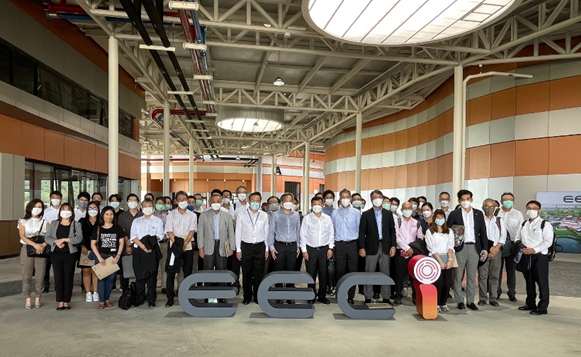On Tuesday 30 August 2022, Prof. Dr. Sukit Limpijumnong, President of National Science and Technology Development Agency (NSTDA) and the management team welcomed H.E Mr. Nashida Kazuya, the Japanese Ambassador to Thailand, Mr. Takeo Kato, President of the Japanese Chamber of Commerce Bangkok (JCC), Mr.Shoichi Ogiwara, Vice President and Chairman of BCG Business Committee, JCC and more than 60 representatives from Japanese companies visited the Eastern Economic Corridor of Innovation (EECi) at Wangchan Valley, Rayong.

EECi is the new premier innovation hub in Southeast Asia dedicated to the Bio-Circular-Green Economy (BCG) development. It has a large-scale innovation infrastructure to facilitate research translation and technology localization to support the growth of BCG in the Eastern Economic Corridor (EEC) – Thailand’s major manufacturing hub. EECi is the first of its kind for launching new industries with advanced technology and transforming existing manufacturers into sustainable innovation-based industries. The 6 industries targeted by EECi include modern agriculture; biorefinery; battery and modern transport; automation, robotics and intelligent electronics; aviation and medical devices.

This visit offers opportunities for both Thailand and Japan to explore R&D cooperation based on mutual interests and backed by Japan’s Green Growth Strategy and Thailand’s BCG Policy. Guests were given a tour to the following research facilities:
(1) Sustainable Manufacturing Center (SMC) – a key infrastructure in automation, robotics, and intelligence technologies to enable Industry 4.0 transformation in Thai manufacturing sector;
(2) Alternative Battery Pilot Plant – a center to support the development of high-performance batteries with safety and low cost, and provide technical and testing services in the area of renewable energy and energy storage system;
(3) Plant Phenomics Facility and Plant Factory – a comprehensive Plant Phenomics Solution Center offers a wide range of services, consultation, and comprehensive technical training to facilitate the transition to modern farming; and
(4) Biorefinery Pilot Plant – a platform for scaling up biorefinery production processes to convert biomass to biobased products.


